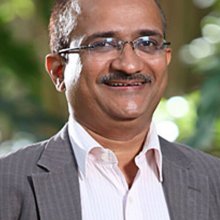Polymer MEMS/NEMS Sensor Systems: Opportunities and Challenges
Polymers enable fabrication of MEMS/NEMS devices with superior electro-mechanical characteristics as compared to the traditional silicon MEMS. These technologies are also ideally suited for low cost disposable sensor applications, as well as for applications that require high surface stress sensitivity. The applications for polymer MEMS range from healthcare to homeland security. There are however multiple issues that need to be addressed in order to make the polymer MEMS a mainstream technology. One of the issues is related to the electro-mechanical transduction sensitivity, which requires integration of novel materials and process techniques. The other issue concerns the stability of polymer materials in atmosphere, when used as sensors. CMOS compatibility of these materials processing is another issue. In this talk, we will look at some of the approaches for addressing these concerns using a variety of processes & materials. The approaches for enhanced transduction sensitivity in polymer MEMS devices include integration of a highly strain sensitive organic transistor with a polymer micro-cantilever (CantiFET), integration of nanoparticles and nanowires into the polymer layers, as well as use of graphene as a transduction material with polymer micro-cantilevers. The stability issues are addressed using a range of low-temperature deposited materials for passivation purposes. The polymer device processing also needs to be CMOS compatible in order to enable eventual integration of these technologies into the CMOS platforms for the Internet of Things (IoT) applications. This talk discusses the current status of research with polymer MEMS using real world applications.

Prof. V. Ramgopal Rao
Director, Indian Institute of Technology (IIT), Delhi on June 12, 2017 at 11:00 AM in 454 Monteith Research Center
Dr. V. Ramgopal Rao is currently the Director, IIT Delhi. Before joining IIT Delhi as the Director in April 2016, Dr. Rao served as a P. K. Kelkar Chair Professor for Nanotechnology in the Department of Electrical Engineering and as the Chief Investigator for the Centre of Excellence in Nanoelectronics project at IIT Bombay. Dr. Rao has over 400 publications in the area of Electron Devices & Nanoelectronics in refereed international journals and conference proceedings and is an inventor on 35 patents (including 13 issued US patents) and patent applications, with many of his patents licensed to industries for commercialization. He is a co-founder of two startup companies at IIT Bombay which are developing products for security and agricultural sensor applications. Dr. Rao is a Fellow of IEEE, a Fellow of the Indian National Academy of Engineering, the Indian Academy of Sciences, the National Academy of Sciences, and the Indian National Science Academy.
Prof. Rao's work is recognized with many awards and honors in the country and abroad. These include the Shanti Swarup Bhatnagar Prize (the highest award in India for scientific research given by the Hon’ble Prime Minister, Govt. of India), the Infosys Prize (awarded to him by the seventh Secretary-General of the United Nations Mr. Kofi A.Annan), JC Bose National Fellowship and the CNR Rao National Nano Science award among many others. He was an Editor for the IEEE Transactions on Electron Devices during 2003-2012 and currently serves as a Distinguished Lecturer, IEEE Electron Devices Society.
For more information about Prof. Rao’s current research interests and a list of publications visit: http://www.ee.iitb.ac.in/~rrao/
Created and hosted by the NC State Department of Electrical and Computer Engineering, the ECE Distinguished Speaker Colloquium is our flagship seminar series, featuring presentations from distinguished speakers drawn from both academia and industry who will address a wide variety of topics of interest to our community. Everyone is invited to attend, from undergraduates on up to faculty and industry friends -- the level of the presentations will be for non-specialists and accessible to students.
